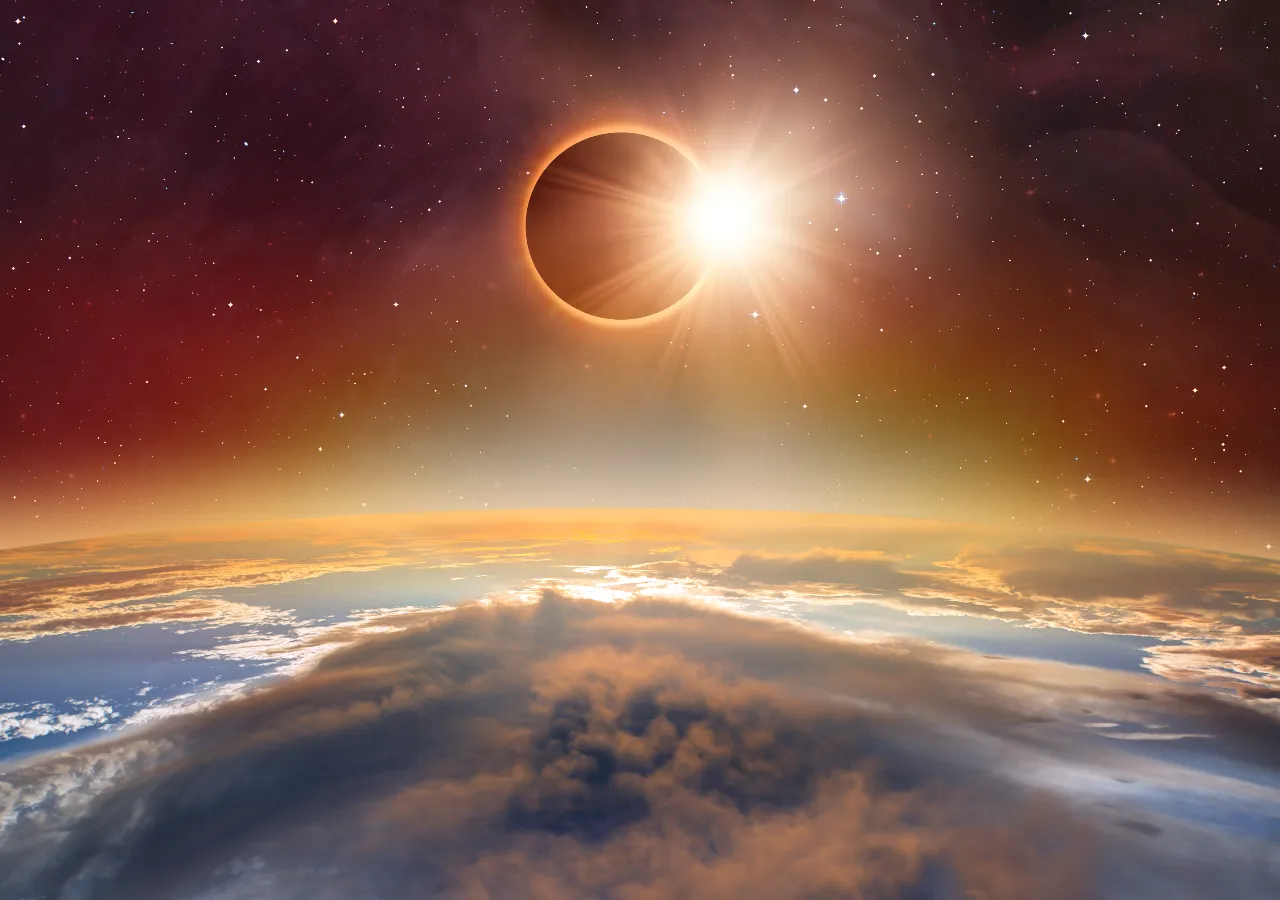Tomorrow we are expecting to experience a solar eclipse across much of North America! Here in Arkansas, there has been a lot of buzz about it, being that a good chunk of our state is in the path of totality. Apparently NASA is going to be broadcasting live from a town about 120 miles south of where I live. So that is kind of cool!

But I know deep down that there is more to why I have found this topic to frequent my heart and mind the past couple of weeks. I believe there is such an opportunity here for us to do more than just stare up at the sky with funky glasses on and be entertained for a few minutes!
Earlier this week, I discovered a sermon that was preached by Charles Spurgeon in London on Sunday, March 14th, 1858. It was the day before a solar eclipse was set to take place in England, and he used the occasion to teach on the ways of God and point people to Him. So today I am going to share with you some excerpts from that sermon, in hopes that it will help prepare you (as it has me) to experience tomorrow’s events in a much more powerful and significant way!
I am the Lord, and there is no other.
I form the light and create darkness,
I bring prosperity and create disaster;
I, the Lord, do all these things.”
Isaiah 45:7
“We are all expecting tomorrow to witness one of the greatest sights in the universe—the annular eclipse of the sun. (March 15, 1858 12:07 PM GMT) It is possible that many of us shall have gone the way of all flesh before such a sight shall again be seen in this country and we are therefore looking forward to it with some degree of expectation. It is probable that hundreds and thousands of the human race will be attracted by it, to study for a few hours at least, the science of astronomy.
Surely I need offer no apology whatever if religion comes forward today, and asks that attention should be drawn to her, even by the eclipse itself. Without a doubt, if there are sermons in stones, there must be a great sermon in the sun; and if there are books in the running brooks, no doubt there is many a huge volume to be found in a sun having an eclipse. All things teach us, if we only have a mind to learn. There is nothing which we can see, or hear, or feel, which may not be the channel of great instruction to us. Let us see whether this may not lead us this morning into a train of thought which may, under God’s blessing, be something far better to us than the seeing of an eclipse.
First of all, eclipses are a part of God's plan.
I believe that here among a very great number of us, an eclipse is looked upon as something contrary to the general law of nature. Now, beloved, all who understand anything of God’s works, know very well that eclipses are as much a part of nature’s laws as the regular sunshine, that an eclipse is no deviation from God’s plan, but that it is a necessary consequence of the natural motion of the moon and the earth around the sun and each other, that there should at some stated periods be eclipses, and when we see the eclipse tomorrow, we shall not look upon it as a miracle or anything out of the ordinary course of God’s providence, but we shall say it was a necessity involved in the very plan by which God governs the earth.
There are certain eclipses which happen in God’s providence as well as in God’s grace. As in nature an eclipse is part of God’s plan, and is in fact involved in it, so we believe that in providence the eclipse shall sometimes overshadow the earth. I mean, the adversities, the wars, the famines, which sometimes fall on the human race, are only a part of God’s divine plan of governing the earth, and have some beneficial object in their happening to us.
First, let me invite your attention to providence at large.
How many times have we seen providence itself eclipsed with regard to the whole race?
God sends a flood of rain… the whole human race, with the solitary exception of eight people, having been swept away.. This is what I mean by a providential eclipse. After that God again allows man to multiply, and the earth to be repopulated. Year after year the earth laughs with harvest, and the fields are made glad with God’s bounties… and lo! there comes an eclipse of God’s bounty.
But I need not stop to enumerate the thousand instances that have happened in history. Nations have grown strong and mighty; immediately there has come an eclipse of their glories, and all that has been built has crumbled to the earth.
Some savage conqueror from the north has descended with his barbarous hordes, and swept away every vestige of civilization.
A city is prosperous and rich. In one unhappy night a fire seizes upon it, and like the stubble before the flame, the whole city is consumed.
At another time a plague is upon the multitudes, and the pits are filled with the dead. Nations die and perish, and whole hosts of men are carried to their graves.
Now, all these great eclipses of God’s favour, these darkenings of the heavens, these sudden glooms that fall upon the human race, are parts of God’s plan of providence. Beloved, believe me, it is God’s providence, when his paths drop fatness, and when the valleys rejoice on every side. It is a part of his plan when the fields are covered with grain, and when there is grass for the cattle; but it is equally as much a part of the plan of his providence to reduce the earth to famine, and bring the human race to misery at certain stated seasons, when he sees that an eclipse is absolutely necessary for their good.
It is just the same with you in your own private concerns. There is a God of providence to you...
When you were rejoicing in the brightness of your light, suddenly a midday midnight has fallen upon you, to your horror and dismay. You are made to say, “From where does all this evil come upon me? Is this also sent by God?” Most assuredly it is. Your penury, your sickness, your bereavement, your contempt, all these things are as much ordained for you, and settled in the path of providence, as your wealth, your comfort, and your joy. Do not think that God has changed. It involves no change of the sun when an eclipse overshadows it. The sun has not moved from its predestined spot. There it stands, fixed and secure; or if it is true that it moves, still it moves with such regularity that to us it seems to stand still. Beloved, it is so with God. It may be that his purposes are moving onward to some great and distant goal, which yet we cannot see, circling around himself in some greater circle than human knowledge yet can guess; but this is certain, that, as far as we are concerned, God is the same, and of his years there is no end, and from his fixed and settled path he has not swerved. His glory is undimmed, even when eye cannot see it. His love is just as bright, even when its shinings are concealed. He has not moved to the right hand nor to the left. With the Father of lights there is no variableness, neither the shadow of turning. He abides fast and fixed though all things pass away. Let me confide then in him. Eclipses in providence, like eclipses in nature, are only a part of his own grand plan, and necessarily involved in it.
Moving in the predestined orbit of divine wisdom, the eclipse is absolutely and imperatively necessary in God’s plan of government. Troubles must come; afflictions must happen, it must needs be that for a season you should be in heaviness, through many trials.
But I have said, that eclipses must also occur in grace, and it is so. God’s rule in grace is still the circle. Man was originally pure and holy; that is what God’s grace will make him at last. He was pure when he was made by God in the garden. That is what God shall make him, when he comes to fashion him like to his own glorious image, and present him complete in heaven. We begin our piety by denying the world, by being full of love to God; we often decline in grace, and God will bring us back to the state in which we were when we first began, so that we shall rejoice in no one except Christ, and give our hearts to him as we did at first. Hence, there must be an eclipse in grace, because even there the circle seems to be the rule of God’s gracious government.
Now beloved, some of you are in the eclipse today...
“Today my spirit sees no heaven, it has no hopes, but many fears; no joys, but much distress;” and you are apt to say, dear friends, “Is this a part of God’s plan with me? Can this be the way in which God would bring me to heaven?” Yes, it is even so. The eclipse of your faith, the darkness of your minds, the fainting of your hopes, all these things are only the parts of God’s plan for making you ripe for the great inheritance into which you shall soon enter. These trials are only waves that wash you on to the rocks; they are only winds that waft your ship the more swiftly towards the desired haven.
Oh! do not think, Christian, that your sorrows are out of God’s plan; they are necessary parts of it; and inasmuch as he will bring many heirs of God to glory, it is necessary that through much tribulation he should bring them there.
The rising has its ebb, the summer has its winter, and the joyous time has its season of despondency to follow it; but, beloved, all this is a part of God’s plan.
Do not think then that eclipses of our holy religion, or the failure of great men in the midst of us, or the decline of piety, is at all apart from God’s plan; it is involved in it, and as God’s great purpose moving in the circle to bring forth another gracious purpose on earth must be accomplished, so beloved, an eclipse must necessarily follow, being involved in God’s very way of governing the world in his grace.

Everything God does has a purpose.
When God creates light he has a reason for it, and when he creates darkness he has a reason for it too. God does not always tell us his reason; he always has one.
Now I cannot tell you what God’s purpose is in eclipsing the sun tomorrow.
However, we are not left in any darkness about other kinds of eclipses; we are quite certain that both providential eclipses and gracious eclipses have their reasons. When God sends a providential eclipse he does not afflict willingly, nor grieve the children of men for nothing.
God has some purpose in all these things, and permit me to tell you what I believe to be God’s purpose, when he sends troubles into the world, and when he sends troubles upon us. It is this, it is to draw our attention to himself.
Now do you not notice, that when everything goes well with the world they never think about God? People always get religious when they get into trouble.
“Surely in trouble they will seek the Lord; in the day of their distress they will seek me early.” Doubtless, we would entirely forget God, if it were not for some of those eclipses which now and then happen. God would not have his name remembered on earth at all by the race of man if he did not make them remember his name, when he scourged it into them with his rod. Famine, pestilence, the sword, the flood, all these must come upon us to be terrible reminders, to make us think of the dread King who holds the thunders in his hand, and keeps the lightnings in his power. Doubtless, this is God’s great purpose in his afflictive providences, to make us think of him. But there is another purpose. Sometimes troublous times tend to prepare the world for something better afterwards.
There is a story told, that in the olden times, Artaxerxes and another great king were engaged in a furious fight. In the middle of the battle a sudden eclipse happened, and such was the horror of all the warriors that they made peace there and then. Oh! if an eclipse of trouble would induce you to lay down arms and seek to be reconciled to God! Sinner, you are fighting against God, lifting the arm of your rebellion against him. Happy shall you be if that trouble which is now fallen upon you should lead you to throw down the weapons of your rebellion and flee to the arms of God and say, “Lord have mercy upon me a sinner.” It will be the best thing that you have ever done. Your trouble will be far better to you than joys could have been, if your sorrows shall induce you to flee to Jesus who can make peace through the blood of his cross. May this be the happy result of your own troubles and sorrows.
But furthermore, eclipses of grace have also their end and purpose.
The Christian asks why it is that God does not seem to favour him in his conscience as much as he did previously. “Why is it that I do not have more faith? Why have the promises lost their sweetness? Why has the Word of God seemed to fail in its power in operating upon my soul? Why has God hidden his face from me?” Christian it is that you may begin to search yourself, and say, “Show me why you contend with me.” God’s people are afflicted in order that they may not go astray. “Before I was afflicted,” said the Psalmist, “I went astray, but now I have kept your Word.” Leave a Christian alone, and he becomes like a piece of iron covered with rust; he loses all his brightness. Take the file of affliction, and once more the brightness becomes apparent. Christians without trouble would be like oysters without some irritant; they would not have produced pearls. The pearl oyster would have no pearl unless some irritant had fallen into it, and were it not for trouble coming upon the Christian, he would live without producing the pearl of a holy and contented piety. God’s rods are improvers; when they are laid upon us they always mend us. God wounds the Christian, that he may cleanse him of his sins; he ploughs him deep that he may turn up the subsoil to the air, that the influence of the Divine Spirit may rest upon him. He puts us into the crucible and into the furnace, that the heat may burn away our dross, and may consume all our impurities. He sends us into the deep waters, that they may be like a sacred baptism to us, and may help in sanctifying us, by delivering us from our pride, our lust, our worldliness, and our conceit. Happy is the man who understands this—who knows that all things work together for good to those who love God, and believes that even an eclipse of God’s countenance has its end and purpose, in making him perfectly conformed to the image of Christ Jesus the Lord.
What is that which will hide the sun from us tomorrow? It is the ungrateful moon. She has borrowed all her light from the sun month after month; she would be a black blot, if the sun did not shine upon her, and now see all the return she makes is, she goes impudently before his face and prevents his light from shining upon us. Do you know anything at all like that in your own history? Have you not a great many comforts which you enjoy upon earth that are just like the moon? They borrow all their light from the sun. They would not be comforts to you unless God shone in them and they reflected back the light from his countenance. What is your husband, your wife; what are your children, your friends, your house, your home? What are all these except moons that borrow their light from the sun? Oh how ungrateful is the time when we let our comforts come before our God; no wonder that we get an eclipse when we put these things that God gave to be our comforts into God’s own throne and make them our idols. Oh! if our children take half of our hearts, if our friends take away our souls from Jesus, if like it was with Solomon, the wife leads the heart astray, if our goods, our house, our lands become the object of our life, if we set our affections upon them instead of setting them upon the things above, no wonder that there is an eclipse. Oh! ungrateful heart that allows these moons of comfort to hide the sun.

Take care Christian, lest your comforts like the moon eclipse your sun.
And now, last of all, a total eclipse is one of the most terrific and grand sights that ever will be seen.
If tomorrow the sun should actually die out, and never shine any more, what a fearful world this would be to live in! And then the thought strikes me—Are there not some men, and are there not some here, who will one day have a total eclipse of all their comforts? Thank God, whatever eclipse happens to a Christian, it is never a total eclipse: there is always a ring of comfort left; there is always a crescent of love and mercy to shine upon him. But note, sinner, when you come to die, however bright though your joys are now, and fair your prospects, you will suffer a total eclipse. Soon your sun shall set, and set in everlasting night…
It is darkness so thick, that hope, which lives anywhere, cannot pierce even a feeble ray through its impenetrable gloom; it is a darkness so black that you have no candle of your own fancy, no fair imagination to illuminate.
I am only talking in simile and metaphor of a matter which not one of us can thoroughly understand, but which each of us must know, unless we are saved by grace. My fellow sinner, have you today any hope that when death shall come you shall be found in Christ? If you have none, beware and tremble; if you have any, take care it is “a good hope through grace.” If you have no hope, but are seeking one, hear me while I tell you the way of salvation.
Jesus Christ, the Son of God, became man; he lived in this world, he suffered and he died; and the object of his death was this—that all who believe may be saved. What you are required to believe is simply this. Christ Jesus came into the world to save sinners: do you feel that you are a sinner? If so, he came to save you. All you have to do—and that grace makes you do—is to believe that he came to save sinners, and therefore came to save you. Note, he did not come to save all; he came to save sinners. All men who can claim the title of sinners, Christ came to save. If you are too good to be a sinner, then you have no part in this matter; if you are too proud to confess that you are a sinner, then this has nothing to do with you; but if with a humble heart, with a penitential lip, you can say, “Lord, have mercy upon me a sinner,” then Christ was punished for your sins, and you cannot be punished for them. Christ has died instead of you; believe on him, and you may go your way rejoicing that you are saved now, and shall be saved eternally. May God the Holy Spirit first teach you that you are a sinner, then lead you to believe that Christ died for sinners, and then apply the promise, so that you may see that he died for you; and that done, you may “rejoice in hope of the glory of God,” and your sun shall never set in an eclipse, but shall set on earth to rise with tenfold splendour in the upper sphere, where it shall never know a cloud, a setting, or an eclipse.”
[That concludes the sermon.]
What more can I say, or do I even need to? Thank you for taking the time to read and reflect on these things. I hope you are encouraged, challenged and blessed by these words God spoke through one His faithful children, as I certainly have been. How very applicable for us still today, 166 years later! Let’s not just watch the eclipse tomorrow… let’s enjoy, remember, praise and surrender.
In closing, this morning at church, we sang the beautiful hymn “Great is Thy Faithfulness,” and this verse landed on my heart in a new way:
Summer and winter, and springtime and harvest;
sun, moon, and stars in their courses above
join with all nature in manifold witness
to Thy great faithfulness, mercy, and love.

Click here for a link to the full sermon.


